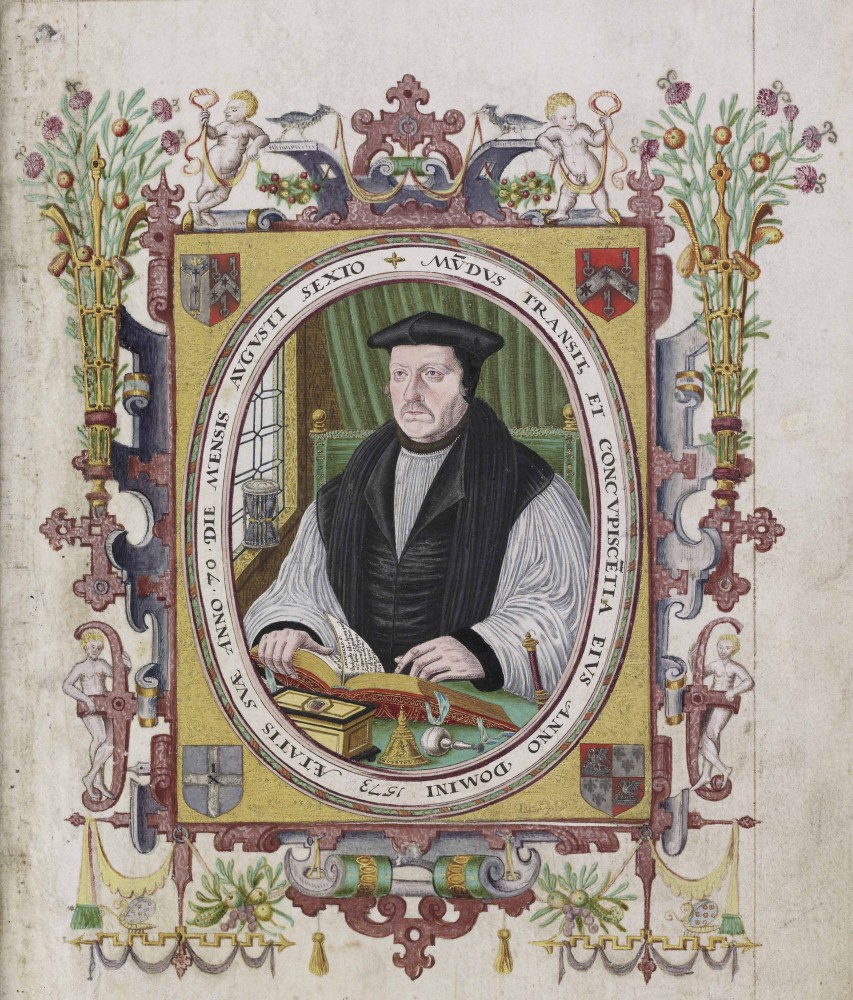Matthew Parker (1504 - 1575)
 Matthew Parker (1504-75) was a powerful figure of the English Reformation who was largely responsible for the Church of England as a national institution. Parker's talents were sought by both Henry VIII and Elizabeth I. He served as chaplain to Anne Boleyn and proved himself a capable administrator, becoming Master of Corpus Christi College (1544-53), Vice-Chancellor of Cambridge University, and Archbishop of Canterbury (1559-75). A benefactor to the University of Cambridge, Parker's greatest tangible legacy is his library of manuscripts and early printed books entrusted to Corpus Christi College in 1574. He was an avid book collector, salvaging medieval manuscripts dispersed at the dissolution of the monasteries; he was particularly keen to preserve materials relating to Anglo-Saxon England, motivated by his search for evidence of an ancient English-speaking Church independent of Rome. The extraordinary collection of documents that resulted from his efforts is still housed at Corpus Christi College, and consists of items spanning from the sixth-century Gospels of St. Augustine to sixteenth-century records relating to the English Reformation.
Matthew Parker (1504-75) was a powerful figure of the English Reformation who was largely responsible for the Church of England as a national institution. Parker's talents were sought by both Henry VIII and Elizabeth I. He served as chaplain to Anne Boleyn and proved himself a capable administrator, becoming Master of Corpus Christi College (1544-53), Vice-Chancellor of Cambridge University, and Archbishop of Canterbury (1559-75). A benefactor to the University of Cambridge, Parker's greatest tangible legacy is his library of manuscripts and early printed books entrusted to Corpus Christi College in 1574. He was an avid book collector, salvaging medieval manuscripts dispersed at the dissolution of the monasteries; he was particularly keen to preserve materials relating to Anglo-Saxon England, motivated by his search for evidence of an ancient English-speaking Church independent of Rome. The extraordinary collection of documents that resulted from his efforts is still housed at Corpus Christi College, and consists of items spanning from the sixth-century Gospels of St. Augustine to sixteenth-century records relating to the English Reformation.
The Parker Library's holdings of Old English texts account for one of the most significant collections of Anglo-Saxon manuscripts anywhere in the world, including the earliest copy of the Anglo-Saxon Chronicle (c. 890). The library also contains key Anglo-Norman and Middle English texts including the Ancrene Wisse and the Brut Chronicle and one of the finest copies of Chaucer’s Troilus and Criseyde. Other subjects represented in the collection are music, including the earliest known example of polyphonic music produced in England, medieval travelogues and maps, apocalypses, bestiaries, and historical chronicles. The illuminated manuscripts held within the collection, notably an illustrated copy of Prudentius’s Psychomachia (c. 1000), two giant twelfth-century Bibles from the abbey of Bury St Edmunds and Dover priory (each more than 50cm/20inches tall), as well as the two volumes of the Chronica Maiora written and illustrated by Matthew Paris, are also of unparalleled importance to the study of medieval art.
Further reading
Brook, V. J. K., A Life of Archbishop Parker (Oxford 1962)
Dickins, B., 'The making of the Parker Library', Transactions of the Cambridge Bibliographical Society 6 (1972-6), 19-34
Graham, T., and A. G. Watson, ed., The Recovery of the Past in Early Elizabethan England: Documents by John Bale and John Joscelyn from the Circle of Matthew Parker (Cambridge 1998)
Graham, T., 'Matthew Parker's manuscripts: an Elizabethan library and its use', in The Cambridge History of Libraries in Britain and Ireland, Volume 1: To 1640, ed. E. Leedham-Green and T. Webber (Cambridge, 2006), pp. 322-41
Greg, W. W., 'Books and bookmen in the correspondence of Archbishop Parker', The Library, 4th ser. 16 (1935/6), 243-79
James, M. R., The Sources of Archbishop Parker's Collection of MSS at Corpus Christi College, Cambridge (Cambridge 1899)
McKisack, M., Medieval History in the Tudor Age (Oxford, 1971)
Page, R. I., 'The Parker Register and Matthew Parker's Anglo-Saxon manuscripts', Transactions of the Cambridge Bibliographical Society 8 (1981-5), 1-17
Page, R. I., Matthew Parker and his Books (Kalamazoo, MI 1993)
Wright, C. E., 'The dispersal of the monastic libraries and the beginning of Anglo-Saxon studies', Transactions of the Cambridge Bibliographical Society 1 (1949-53), 208-37